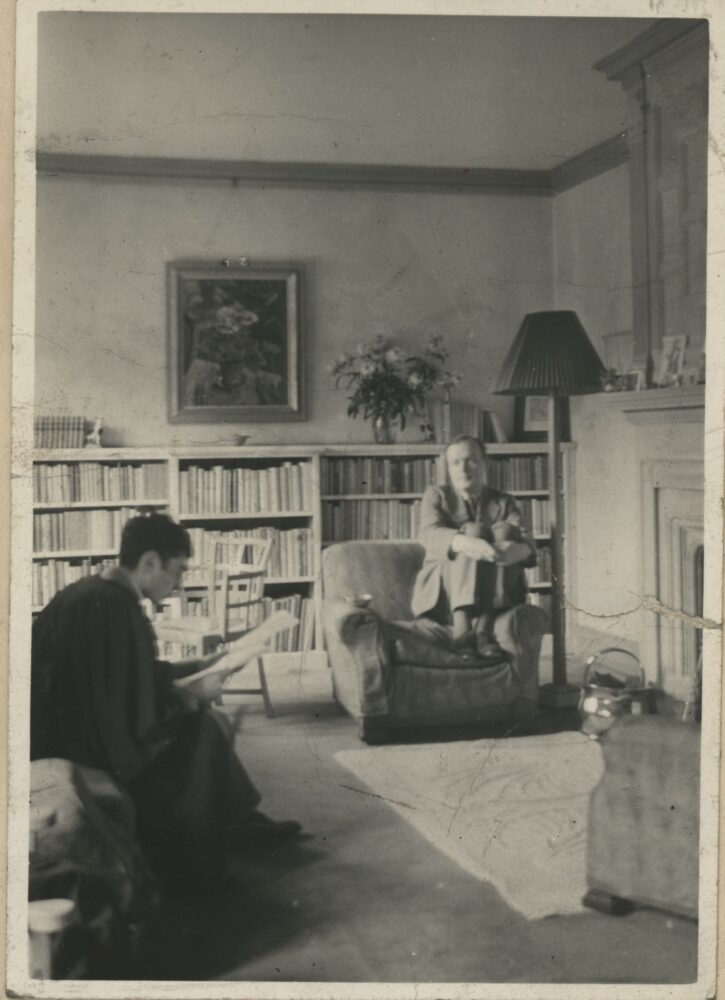

McFarlane was a prolific letter writer and Magdalen College Archives holds hundreds of his letters. After he died, some of his correspondence was published as Letters to Friends: 1940-1966. None of his letters to Helena Wright feature in the book. It is unclear if this was due to the discretion of Wright’s family or an editorial decision. McFarlane was rather candid in his letters to Helena; perhaps his honest opinions (including his first impressions of A.J.P. Taylor) were deemed too honest to appear in print.
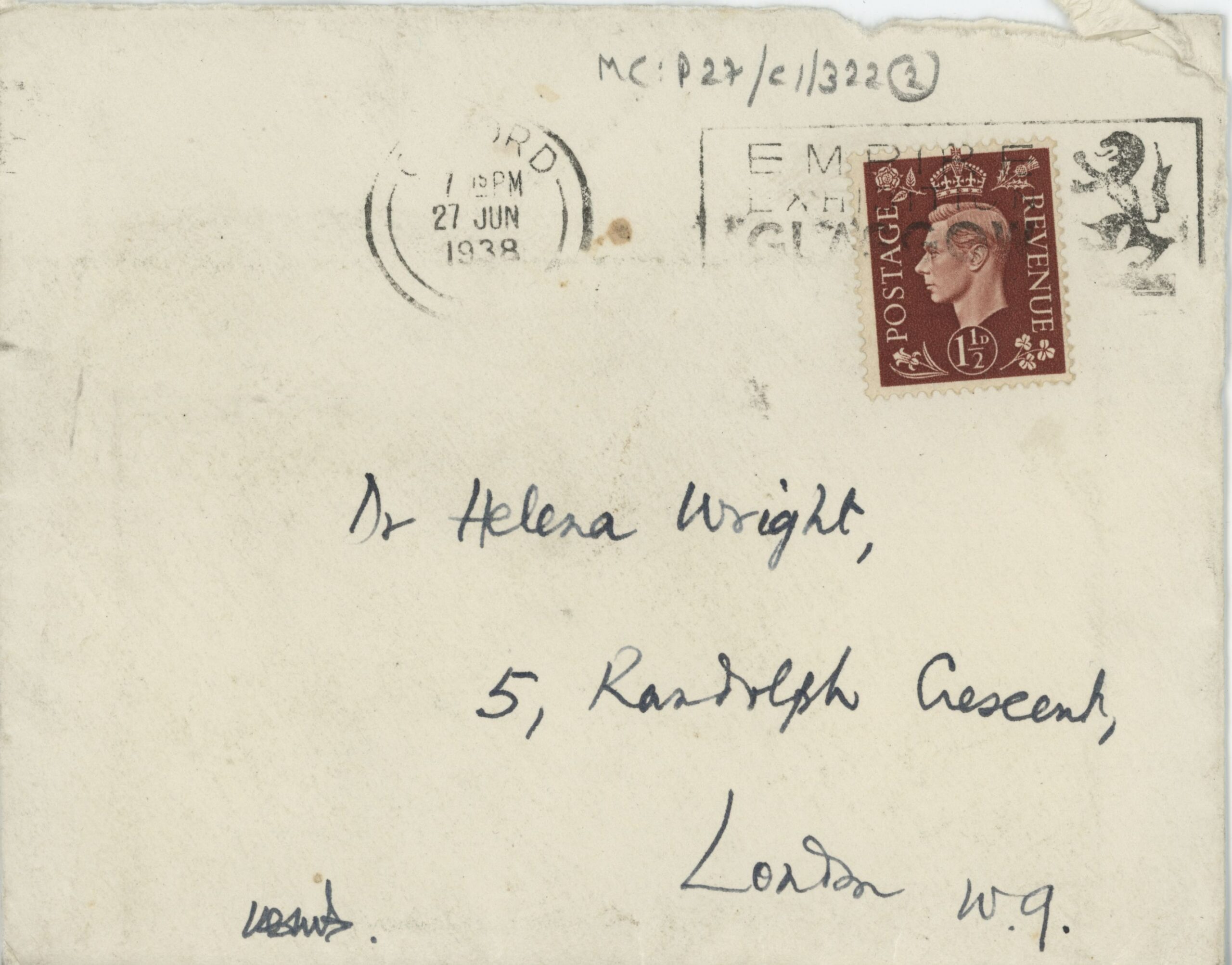
![Handwritten letter on a small sheet of paper. The text, written in pencil, reads: Magdalen 12.5pm 27 June 1938. Darling, a crisis has arisen. When I was in Manchester on Saturday, I saw our new history tutor, Alan Taylor who produced two conditions of acceptance (after he had been duly elected the previous day). If we had known the conditions we might have elected him, but this holding-back until after his election makes rather a difference. I must say that I didn’t like the way in which he has behaved & the conversation I had with him had made me wonder whether we have made a mistake in picking him. His 2 conditions were 1) that he should be allowed to live out of Oxford & 2) that he should not have more than 15 hours teaching a week. As to 1), I asked what he meant by ‘out of Oxford’ and he replied that he would not be prepared to limit himself to even 5 miles; that he should live in the country was an absolute condition of acceptance. As he lives in a Manchester suburb now, that doesn’t seem very reasonable. As to 2) I said that I could promise him no official guarantee but that I could unofficially assure him that he was very unlikely to have an average over the year of more than 15 & that it would in fact wok out at rather less. I assured him that I wholly sympathised with the idea but that[???????????] it would be unfair on the other tutors if he alone were promised an upper limit of hours. He accepted that. But 1) remains. I now find that the statutes exact unconditionally residence in College for the first 3 years after election during Term. I ought to have known of this, but there has been no case of a married tutor (i.e. married when elected) in my time. Oh yes, there was Opie, but his wife was left behind in America for 2 years & didn’t come to Oxford until well on in his 3rd year. I caught the President last night & told him. He said](https://twomagdalenhistorians.magd.ox.ac.uk/wp-content/uploads/2024/05/P27.C1.322_p1-1-scaled.jpg)
![Second page of a handwritten letter on a small sheet of paper. The text, written in pencil, reads: that I’d better consult as many tutors as possible. His own opinion was that we should tell Taylor to got to the devil. Weldon & Parker hold much the same view. I’m now waiting to see the Bursar & am expecting a phone call from Lee at any moment. The President has gone away until Thursday, so when I’ve consulted people I shall be free to go myself. But I thought that it might be best to stay over night, especially as you are not free in the evening. This is all very upsetting. For we may have to start selecting a tutor all over again. I know whom I shall choose & I think I can persuade Lee, but MacKenzie will now be very troublesome & I can’t rely on the President. This business has proved that he was right in not liking Taylor personally. Jack had him (Taylor) to dinner to meet me & I didn’t like him at all. In fact I rather welcome this deadlock made by him as a means of retrieving our mistake. I still think he would be a good tutor & his books prove him a good historian but one interview was enough to show that he’d be a difficult colleague. Seeing in his own home University was different. Also I got the impression that Jacob had only backed him in order to get rid of him. This was only an impression & I maybe owe to my suspicious nature. You may think the residence question unimportant. But I don’t think it is. A College tutor is supposed to be something more than a teacher. He’s supposed to be available nearby not only to take part in the business of the College but also to be at the disposal of undergraduates who need his advice & assistance. A man who [merely?] appears in College for so many tutorial hours a week (there is a suspicious connection between Taylor’s 2 conditions) & then disappears completely is hardly a full member of the college sharing to the full in the collegiate life. If we cared to, we could of course put up with the such absente?, but it is doubtful whether Taylor’s other qualities are sufficiently great to make the sacrifice wise or necessary. Young Williams of](https://twomagdalenhistorians.magd.ox.ac.uk/wp-content/uploads/2024/05/P27.C1.322_p2-1-scaled.jpg)
![Third page of a handwritten letter on a small sheet of paper. The text, written in pencil, reads: Merton, though far less mature, would probably suit just as well. And after seeing Taylor close up for 2 days, I should not be sorry to have Williams instead. The main trouble is that there are as more regular meetings of the College & board until October, but we must act pretty quickly if we are to have a tutor by Michaelmas Term. It’s a damned nuisance. Manchester was awful. The journey took nearly 5 hours. It rained all the time I was there. The university is hideous & in the middle of a slum. Jacob, luxurious & wealthy, lives in squalor compared with an Oxford college. The city was less attractive than I expected. So Manchester is now off the list of Universities to which I would willingly migrate. That leaves Cambridge & London. Jacob is a [bogus?] man. He hadn’t read the thesis but nodded wisely to all my criticisms of it. We talked about a book & I said that it was full of small mistakes of fact. He agreed & said his copy was a mass of corrections. When he wasn’t there I looked & there wasn’t a single correction anywhere. But he is very hospitable & friendly, though not very popular with his colleagues I gathered. 3.30pm The return journey took six hours, 1:45 to 7:45pm. No restaurant on the trains & a change at Chester. I rushed in a Taxi to Magdalen, dropped my bag, ordered sandwiches to be sent to my room & took a taxi to the theatre, where I dropped into my seat as Lambert climbed into the conductor’s rostrum. Three ballets: The Rake’s Progress, Horoscope & Les Patineurs. I greatly enjoyed them in spite of the completely empty stomach. So did William on his full one. Afterwards we feasted on sandwiches & lime juice. I slept like a log until 9:30am. Yesterday was devoted mainly Charles. I found him in a very depressed condition about his Finals after breakfast.](https://twomagdalenhistorians.magd.ox.ac.uk/wp-content/uploads/2024/05/P27.C1.322_p3-1-scaled.jpg)
![Fourth and final page of a handwritten letter on a small sheet of paper. The text, written in pencil, reads: he thought he had done badly on Saturday. So I talked to him & his friend Michael Jefferson in the sunshine on the grass until lunchtime. At 1:30 I drove him to the Cottage. We watered the garden for 2 hours (it has [paused?] all today here!) & walked around. He’d never been before & was charmed and appreciative. Then I took him to Thame for tea, we came back via Brill & Otmoor. He was very grateful & first a little emotional about my kindness. We found Jefferson & Ben Wood & William & a nameless Christ Church undergraduate on the grass where we left them. I rushed out to pick up [Maclagan?] of Oriel for dinner at the [George?}. we played bowls in the dusk and afterwards played the gramophone in my rooms. Today has been spent entirely on this Taylor crisis. I’ve seen the Bursar who favours no compromise. Now I’m waiting for Lee, having at last caught him on the phone. He hasn’t heard yet, but I’ve drafted a letter to Taylor for which I need his approval. ‘Curse, curse’ to misquote Mark’s classic telephone salutation. Mark by the way was here for the Gaudy on Friday. He behaved rather characteristically afterwards. Having picked up Michael Jefferson & some other undergraduates, he insisted that it would be nice to stay the night & kept them talking until 5 am. They were regretting it yesterday; I wonder if he got the kick he expected. Michael Jefferson & Ben Wood are both pretty, so I suppose that was his reason. They thought of him as a very middle-aged person. G. has refused to allow Mrs [Burton?] to go abroad until he has seen her again tomorrow. If he passes her, they go immediately. How was Valewood? I’ll be with you tomorrow all right. I couldn’t very well rush off today with all this unsettled. I hope to see Mackenzie on his return tonight. Love & kisses until tomorrow morning. Bruce.](https://twomagdalenhistorians.magd.ox.ac.uk/wp-content/uploads/2024/05/P27.C1.322_p4-1-scaled.jpg)
1938 letter from K.B. McFarlane to Helena Wright, with his first impressions of A.J.P. Taylor
McFarlane and Wright had a close relationship and he often stayed with her family at their home in Aylesbury. In this letter, he discusses the new History tutor, A.J.P. Taylor, and his wish to live outside of College, referring to the situation as a “crisis.” This reaction may sound rather melodramatic, but McFarlane was correct about the College statutes requiring new Tutors to reside in College (see Statutes below) and he foresaw the difficulties Taylor and his wife would have settling in Oxford (see our section on A.J.P. Taylor’s home life).
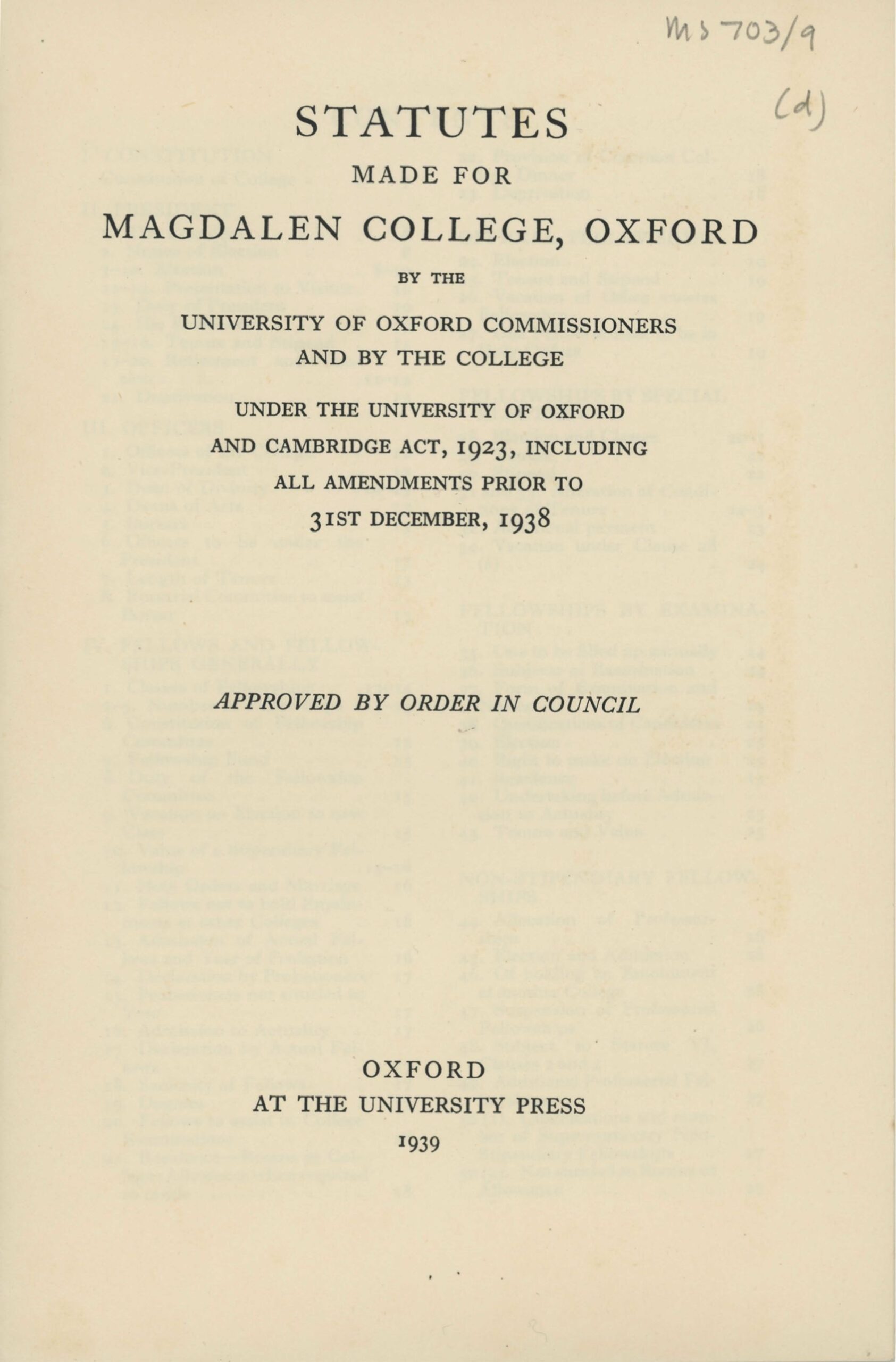
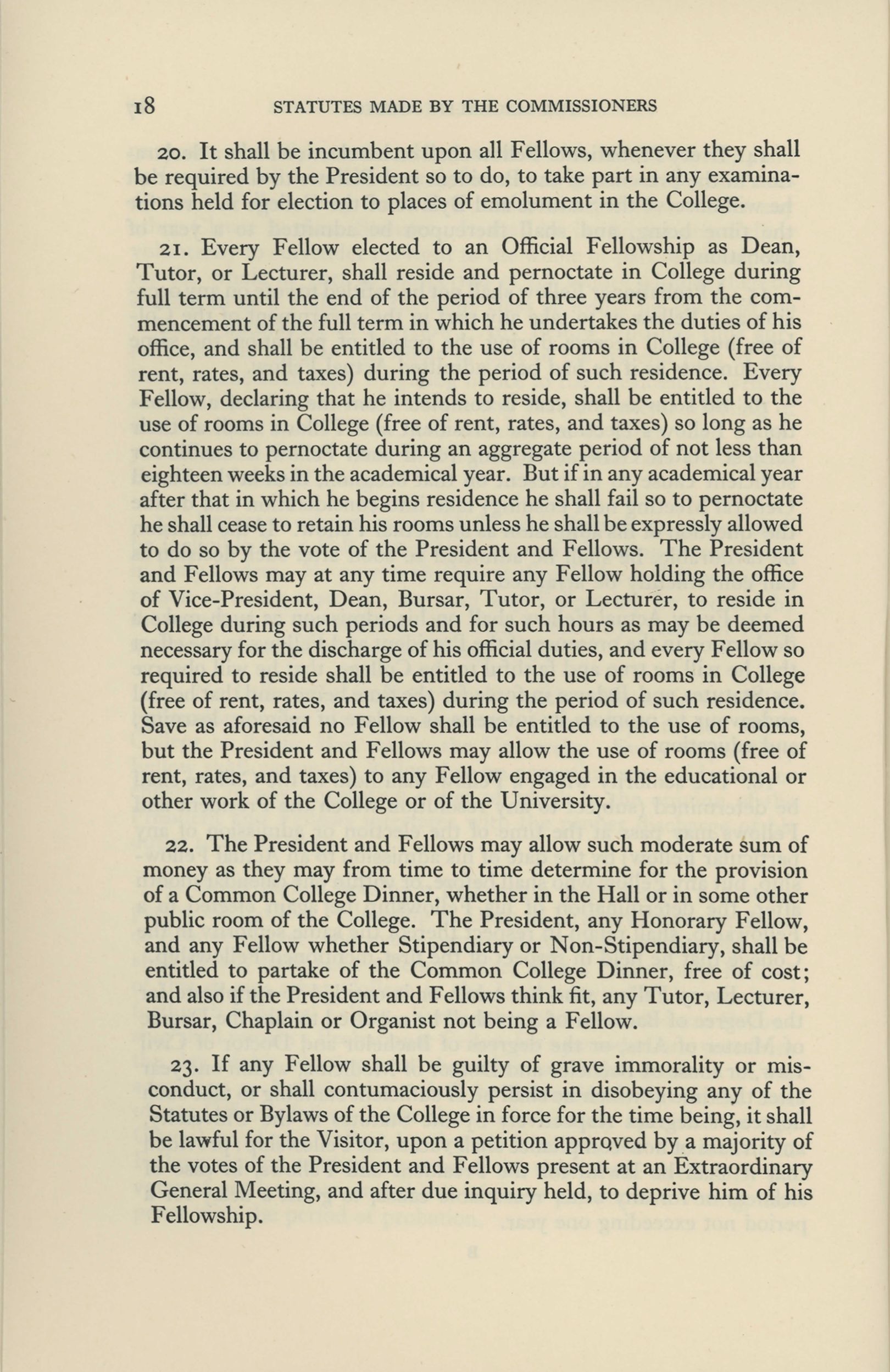
Statutes of Magdalen College from 1938
Prior to A.J.P. Taylor’s appointment as a Fellow of Magdalen College, McFarlane warned him that he would have to reside in College. Taylor was adamant that he would not do so, preferring to live in the countryside. In his memoir, A Personal History, Taylor claimed that McFarlane misled him; that he later realised it had ‘no statutory foundation.’† Here we can see that McFarlane was correct, at least partly. For the first 3 years of their appointment a ‘Dean, Tutor, or Lecturer, shall reside and pernoctate in College during full term.’††
†Taylor, A. J. P. (Alan John Percivale). A Personal History. London: Hamish Hamilton, 1983. Print, p. 130.
†† ‘Statute 21’ in Statutes made for Magdalen College, Oxford, by the University of Oxford Commissioners and by the College, 1938. Magdalen College Archives, MC 703-9 (d)
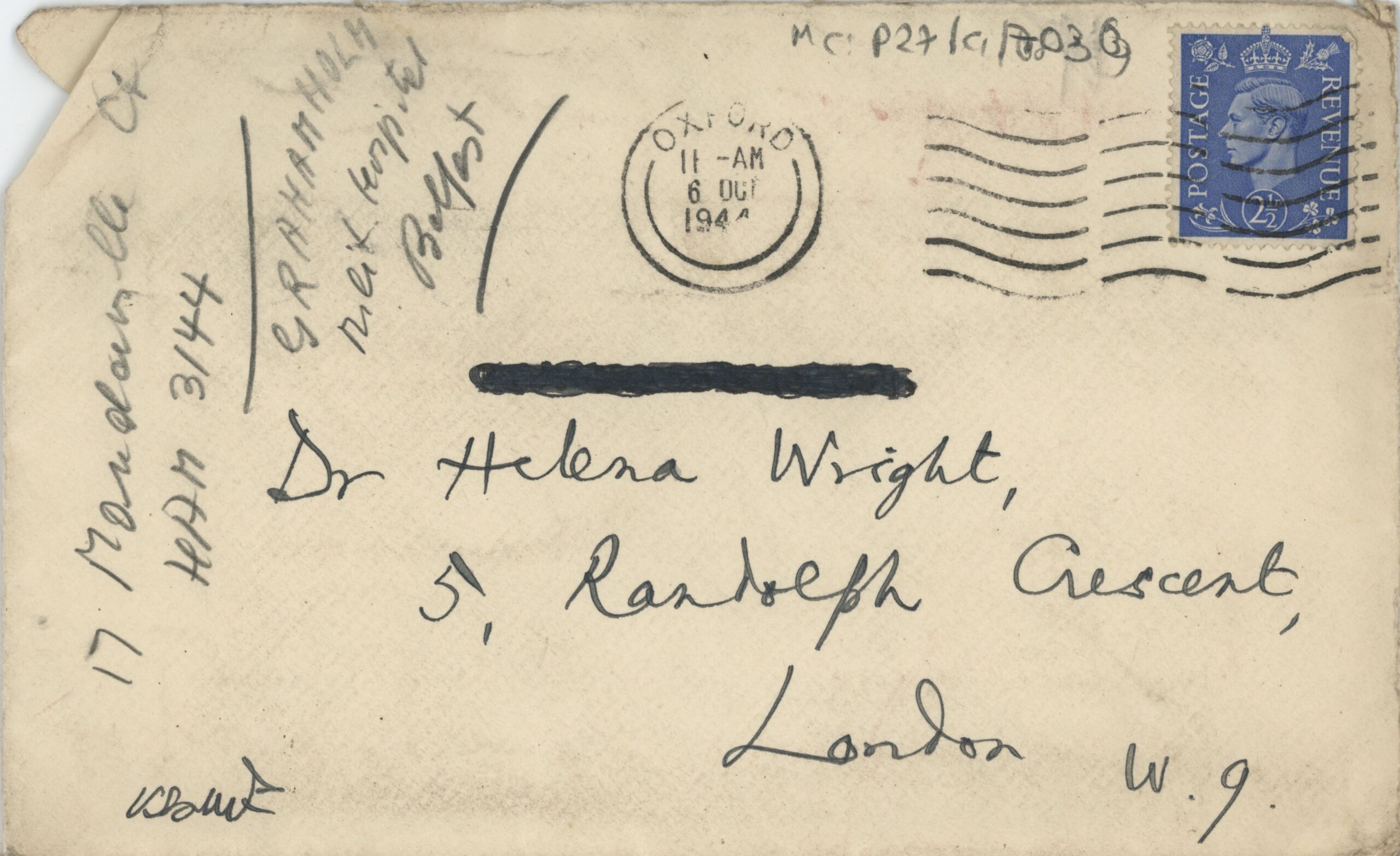
![Handwritten letter on a small sheet of paper. The text, written in pencil, reads: Magdalen College. 5 October 1944. Belovedest, I am so sorry to hear about your ulcer. Poor Helena. And what a bore not to be able to read or write of sew! Can you knit? The Historical Society’s calendar has just come. The first meeting is on the 14 October which, as it is the first day of term here, is impossible for me. Then follows 11 November, 16 December, 13 January, 10 February, 10 March, 12 May, & 16 June. I’ve just has a visit from John [Garnett?]. The Headmasters Conference has been meeting in Oxford & we have been inundated with them. I’ve promised to visit Jack Wolfenden at Shrewsbury & examine for their History prize. Tomorrow a most unusual Thing happens & one of which I am apprehensive as a precedent: I heard it from my step mother that she was coming to Oxford for a week’s holiday at the Eastgate Hotel. I hope she isn’t going to be a nuisance. But perhaps she will return to France to live. Heinz [Koepple?] is coming for the weekend. I go to Manchester on Tuesday, so she won’t have too much of my company. I had a sudden wave of wanting to got to Manchester the other day. Things are so vexing here. John Young is getting](https://twomagdalenhistorians.magd.ox.ac.uk/wp-content/uploads/2024/05/P27.C1.703_p1-scaled.jpg)
![Page 2 of a handwritten letter on a small sheet of paper. The text, written in pencil, reads: wildly above himself & Alan Taylor pulled all the strings of the Tizard puppet more & more openly. It is difficult to turn one’s eyes [????] to other things. However, I have hopes of Cooke. He seems determined to please everybody; he is not going to join the Taylor party. As a result of being personally consulted by him at every turn I am quite won over. He is a hopeless tike with a horrid Lancashire accent, no taste at all and the appearance of a bar-tender. But he is clear-headed, business-like and conciliatory (to me at least). He oughtn’t to be an Oxford don, but since he is we must make the best of him. Unfortunately, the servants dislike him & his chief accountant is already talking of leaving. How they do dislike working for someone who is not an obvious gent! That’s what we said— & it applies to the tenants too (as well as the ????? of other Colleges) – and I am not in the least ready to take back my objections to him. But at least he is not going to be in the Tiz-Taylor pocket and that is something! But when it comes to building—or the other ??? – he’ll be all on the side of the iconoclasts & the philistines. He has no use for The Grove](https://twomagdalenhistorians.magd.ox.ac.uk/wp-content/uploads/2024/05/P27.C1.703_p2-scaled.jpg)
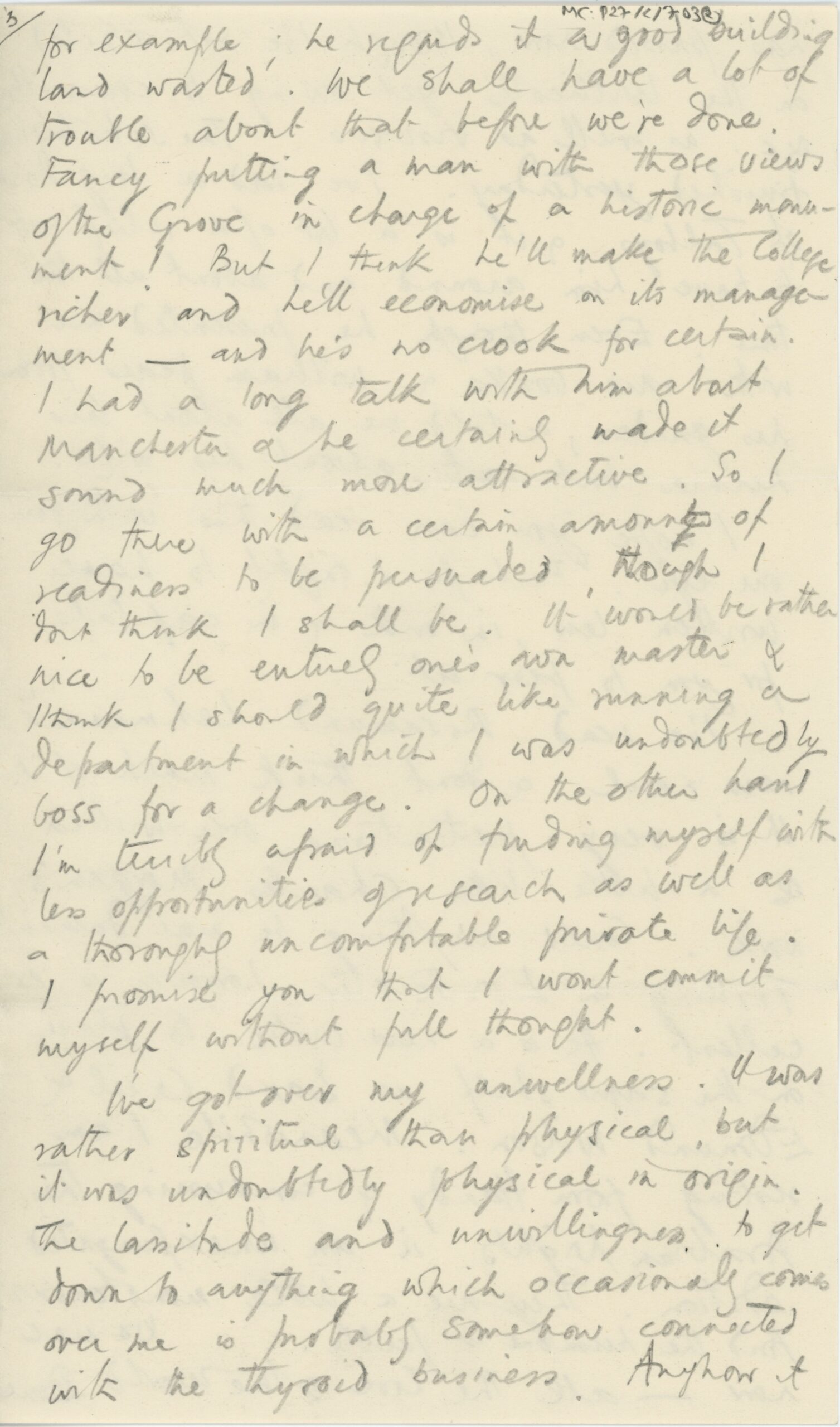
![Fourth and final page of a handwritten letter on a small sheet of paper. The text, written in pencil, reads: has passed now, though I’ve not started on the [??????] yet owing to committees &c. as well as visitors. The scholarships finished yesterday. I’ve had a long dose of [Talboys?] and it is a bit of a relief not to have him around and about all the time. Even though he presented me with rare books & William pears from his garden, & told me all about his [????] but not about his wife. I hope you can read this with your one eye. Perhaps I ought to have written less, in [???] & in capitals for you to peer at. I’ve read Rosamond Lehmann’s new novel & don’t think much of it. It is very pretentious, over-written & a little like Charles Morgan’s work. Could anything be more damning? Trilling on E.M Forster however is excellent. He is a new critic to place on the same shelf as David Cecil & Edmund Wilson. Meanwhile I am resting from Hard & consuming the Arabian Knights in an [unexpurgated?] edition. They are a little monotonous. And the [humour?] is feeble. No more now—all the love of the world Bruce.](https://twomagdalenhistorians.magd.ox.ac.uk/wp-content/uploads/2024/05/P27.C1.703_p4-scaled.jpg)
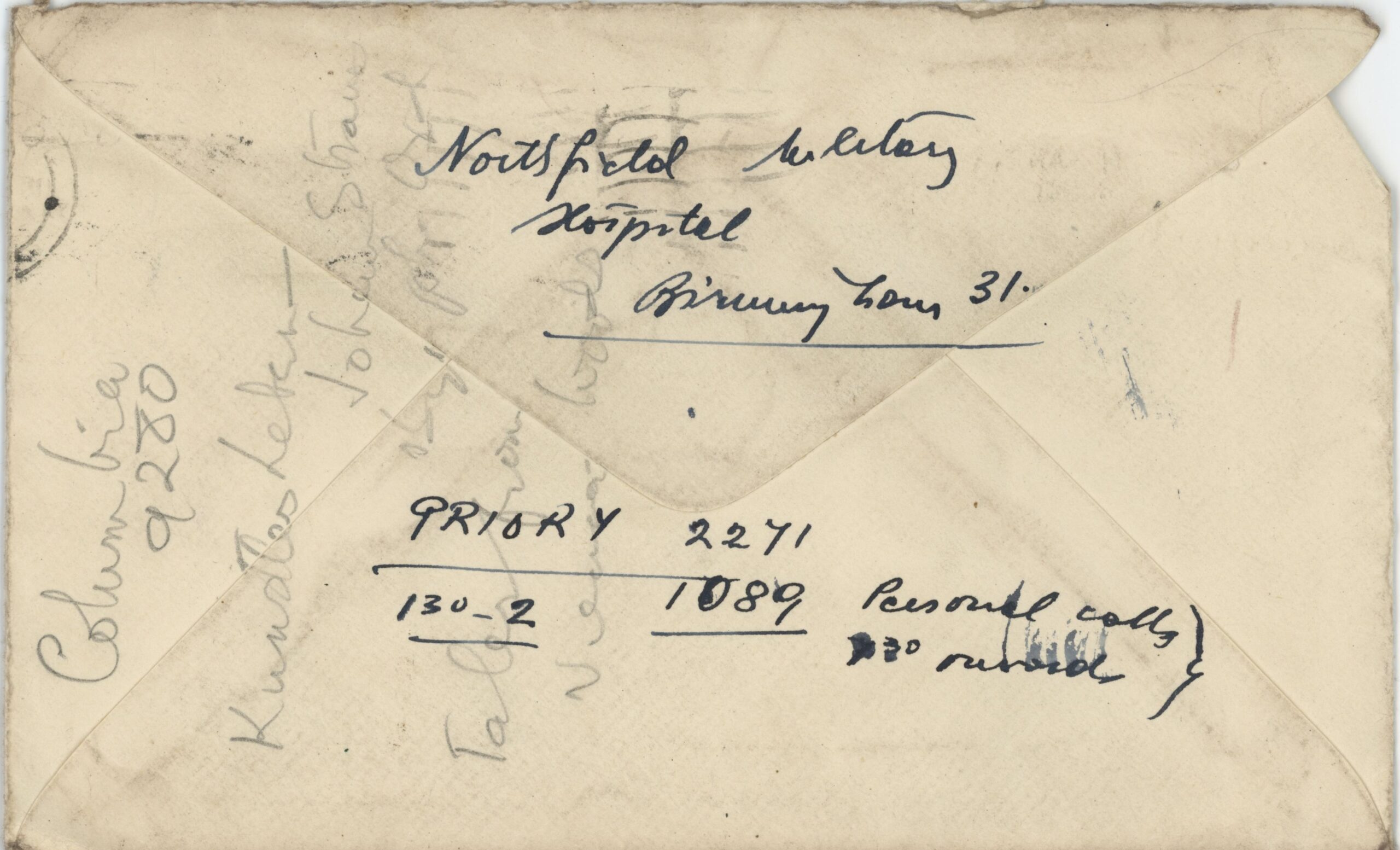
1944 letter from K.B. McFarlane to Helena Wright in which we get a glimpse into College politics
Six years have elapsed since Taylor’s arrival and, from this letter it is clear that McFarlane is unhappy with the influence Taylor has over College affairs. Two years ago, McFarlane had missed out on the role of President to Henry Tizard (a former Magdalen undergraduate, who came from his role as Rector at Imperial College London). Here he suggests that it is really Taylor who is in charge, pulling the ‘strings of the Tizard puppet’ and that there is a division between College members; those in ‘the Taylor Party’ and those outside of it. Further on in the letter, he considers the prospect of leaving Magdalen, for a position at the University of Manchester. He never made the move. If he had, it would have been somewhat ironic; Manchester was where Taylor had worked, before moving to Magdalen.
![Small sheet of paper with handwritten notes in pencil. The text reads: Page 218 NB. The following 1) Tim Allerton. a) ? he lied to his mother when he said he’d had letter from the stockbroker- he had heard from Joanna Southwood [who had stolen Linnet’s pearls at Wode Hall?? If she had, then Linnet was not the good judge of pearls her husband said she was. But J.S. may have taken the pearls only to be copied at Wode Hall. They were stolen on the ship??] b) he & Joanne S. were certainly thick; his mother jealous. Something between him & Rosalie; pp4; 103-4 c) he was unusually annoyed that his mother had asked Poirot to sit at his table. And he gave a reason not true to his psychology viz that Poiriot was a bounder (& a fool!) d) But with Poirot in the Temple expedition. e) his evidence about splash is fishy 164-5 2) Why did Linnet become fey? Why did Jackie’s presence cease to annoy her? Very odd. 3) Miss Van Schuyler’s watch was 10 minutes fast. 4) Richetti’s telegram; he or Bessner the man Race is after? 5) what is the point of Poirot’s Tiens! to wine, whisky & mineral water on p194? And note general question about Joanna S on p195. Tim & Joanna were mixed up in [??????????] jewel robbery. It is fairly clear that he & Joanna are jewel thieves. But this is prob. the principal red herring. 6) Rosalie is clearly covering Tim. 7) Is Ferguson one of the earlier characters & J.S.](https://twomagdalenhistorians.magd.ox.ac.uk/wp-content/uploads/2024/05/P27.C3.2_p1-front-scaled.jpg)
![Small sheet of paper with handwritten notes in pencil. The text reads: 8) What was Tim’s Seccotine for? 9) Rosalie [? & the maid] both saw him come out of Linnet’s cabin. If the maid did, then he murders her… it is probable that she did not see him but the murderer. This is assuming that Tim is not the murderer- on page 218 I do not commit myself; it is too obvious. It is more likely that the maid saw someone else. But I’m quite certain he is a jewel thief (with Joanna).](https://twomagdalenhistorians.magd.ox.ac.uk/wp-content/uploads/2024/05/P27.C3.2_p1-back-scaled.jpg)
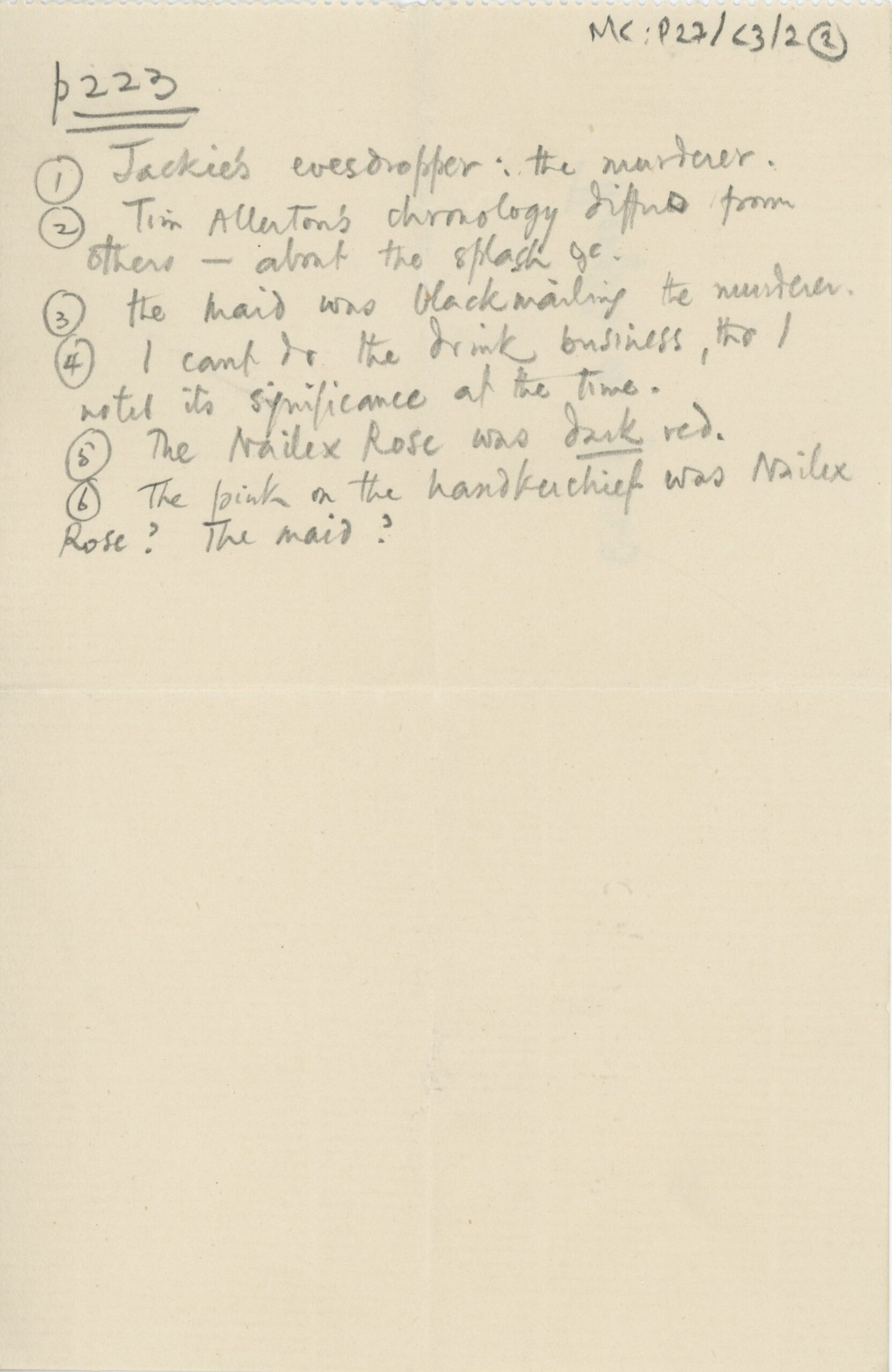
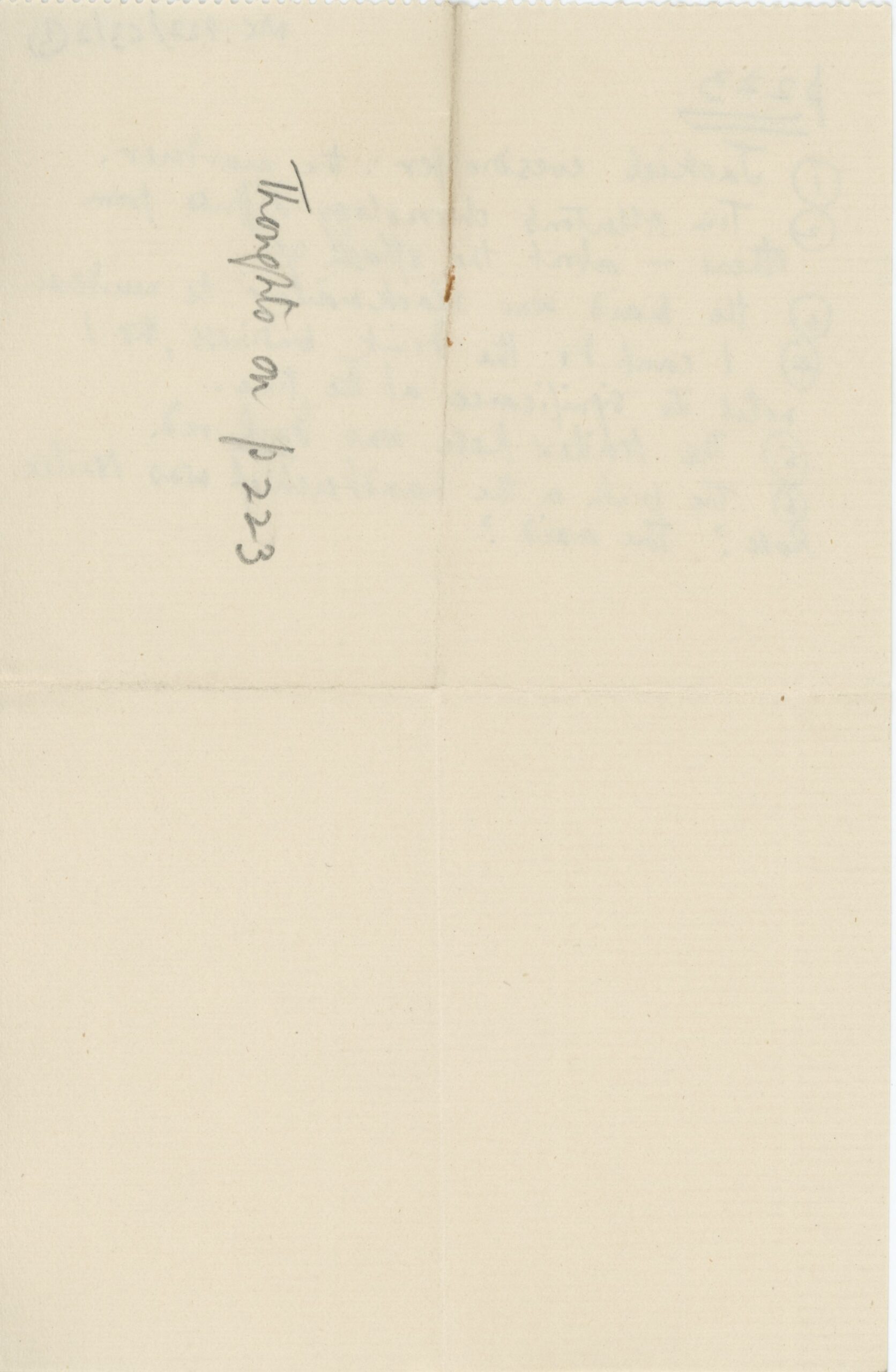
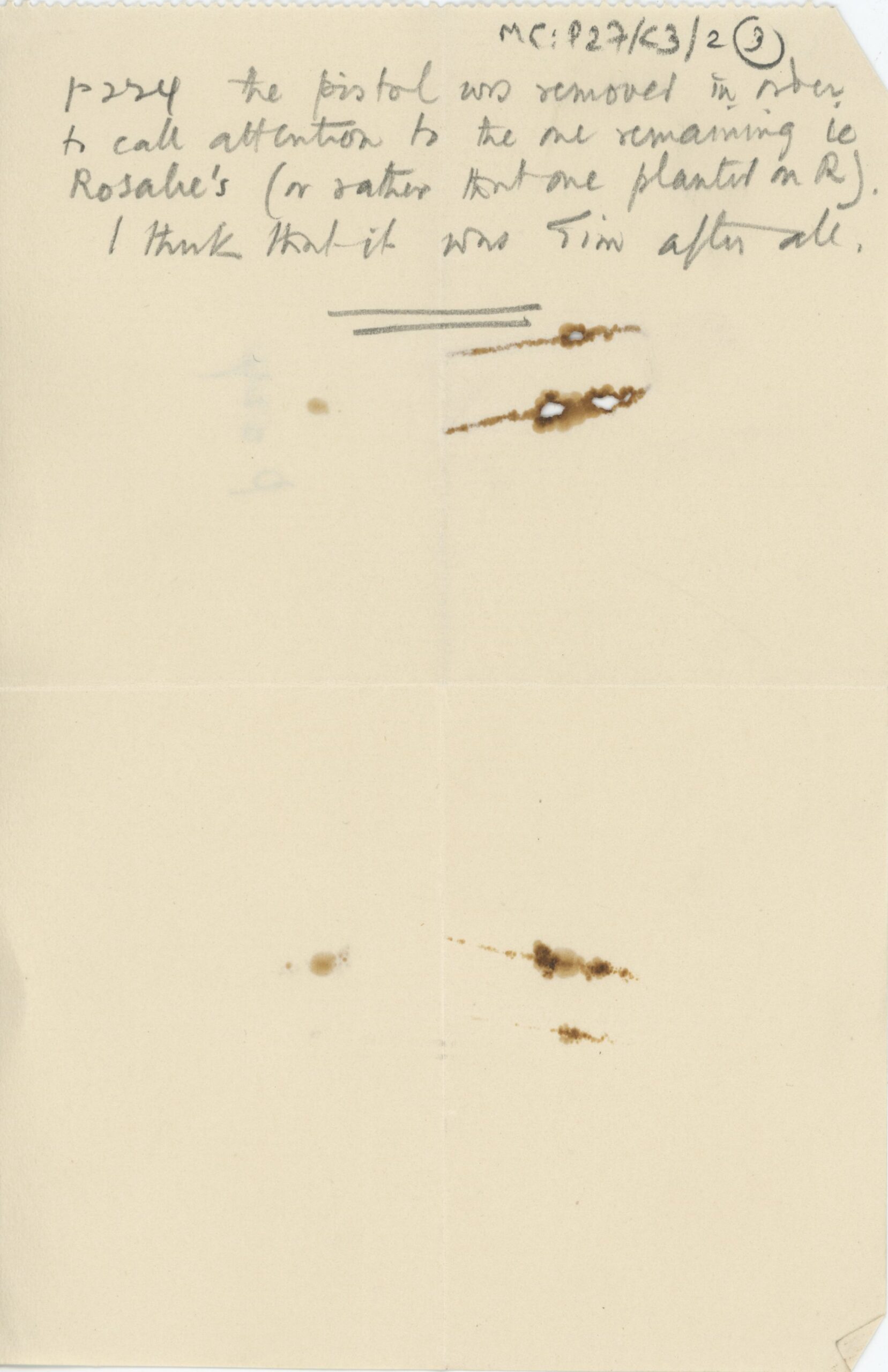
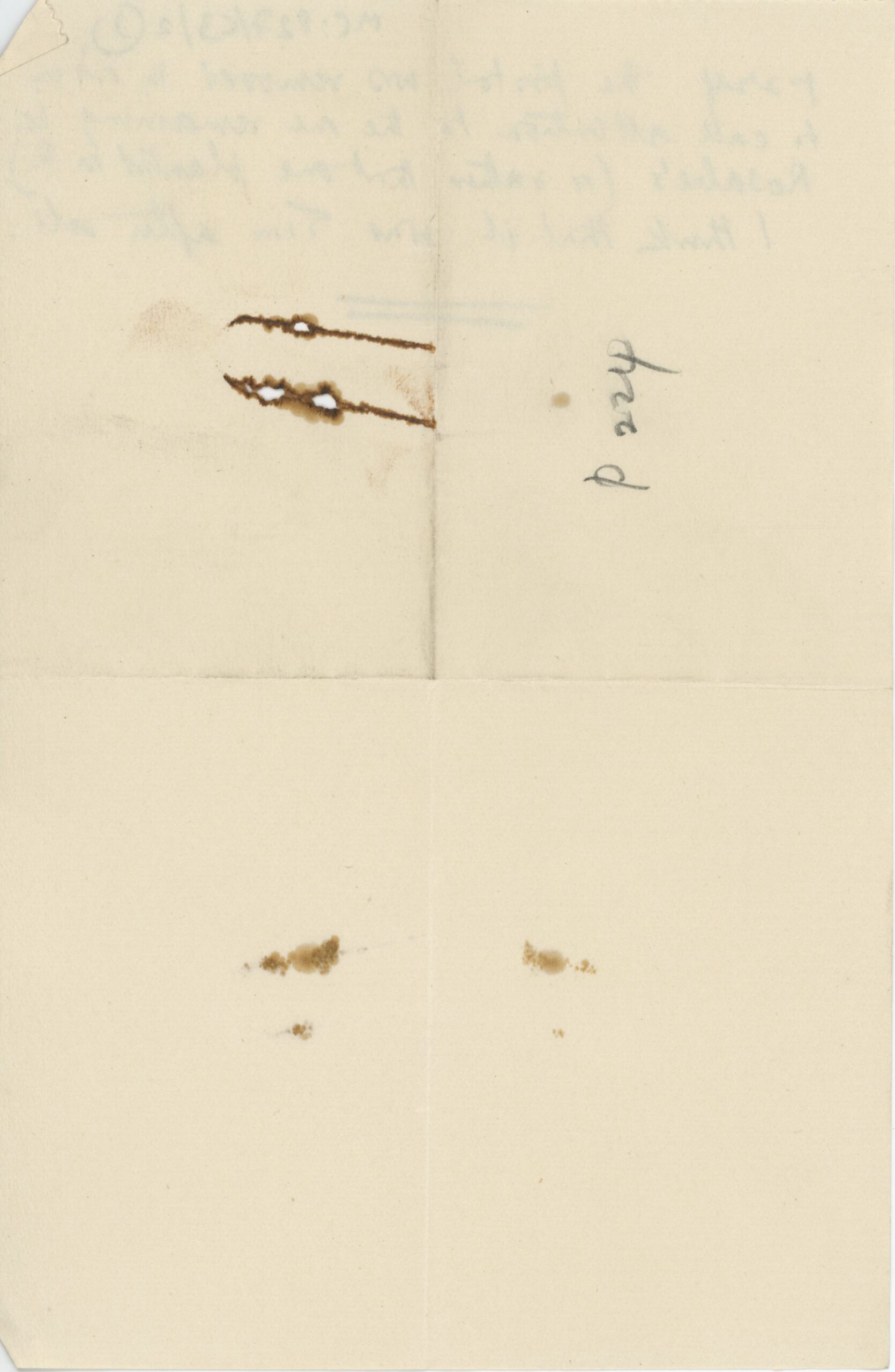
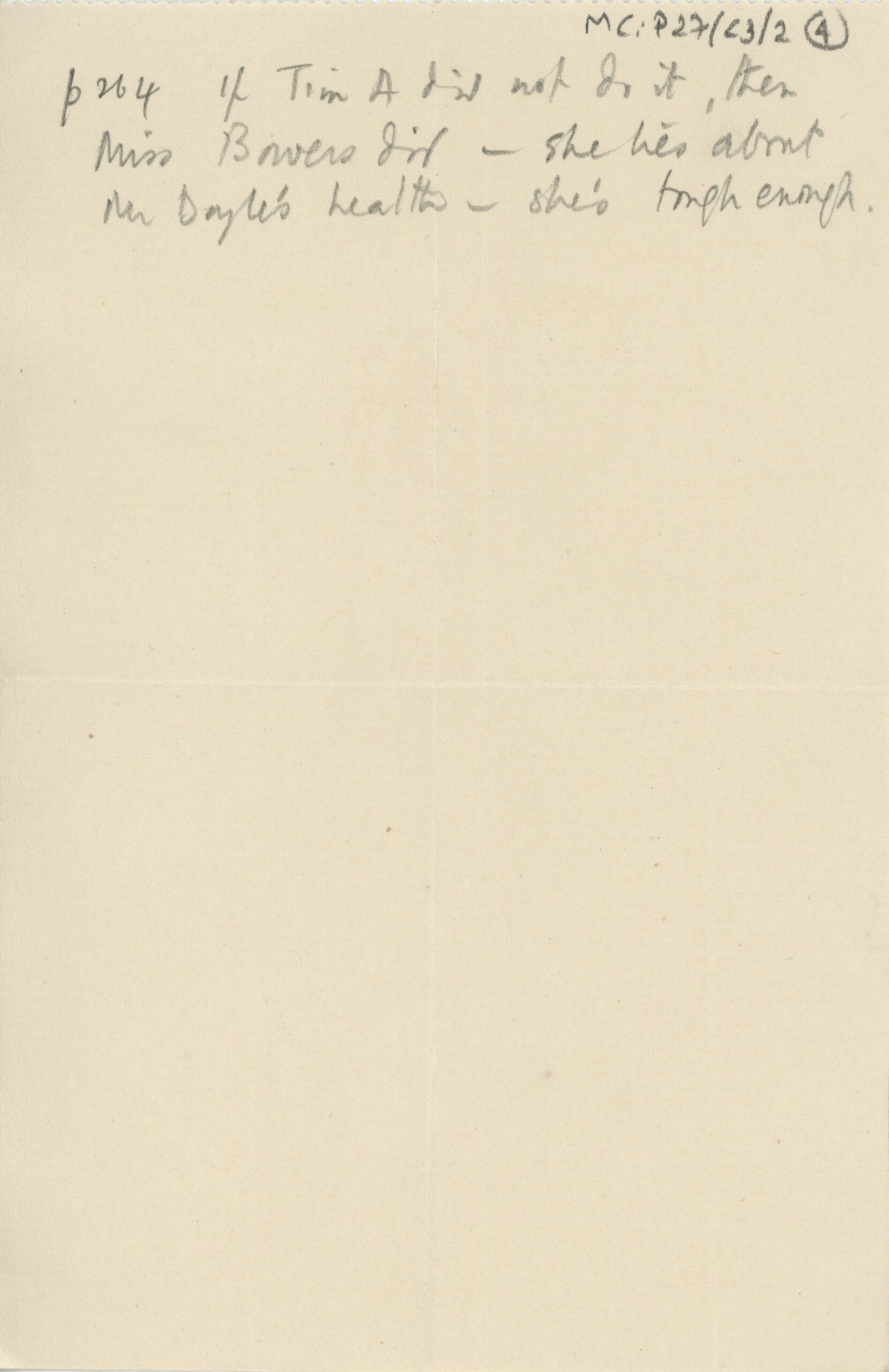
Notes made by K.B. McFarlane when reading Death on the Nile by Agatha Christie
McFarlane applied his meticulous nature to other aspects of his life, beyond his work as a historian. Here we can see him trying to work out ‘whodunnit.’ Sadly, his suspicions of Tim Allerton were ill-founded and, on this occasion, McFarlane got something wrong!
A.J.P. Taylor was a big fan of Agatha Christie. Her detective stories are named throughout his Volume of Books Read and Death on the Nile is listed, too (in September 1949). Perhaps the two men discussed the work over a drink of port in the Senior Common Room!